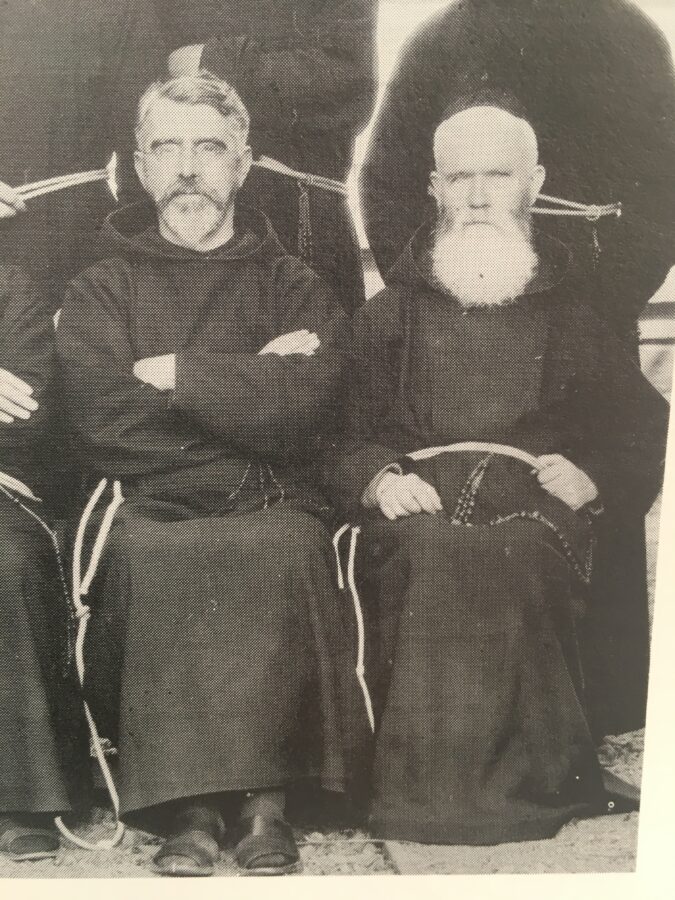
Kieran’s Our City, Our Town Article,
Cork Independent, 26 January 2023
Recasting Cork: Fr Thomas Leaves
The departure of Capuchin Fr Thomas Dowling for the United States in late January 1923 was deemed an end of an era and a distinct loss to the city and the country and a gain for the US. He was bound for mission work in San Francisco, Los Angeles, and other places in California.
For many years Fr Thomas took a leading part in the settling up of harbour disputes and industrial trouble. In general, he gained the confidence of employers and employees. His obituary in the Cork Examiner on 9 January 1951 highlights that he was a native of Kilkenny, where he was born in 1874. He entered the Capuchin Order in his native city at the age of sixteen and was ordained in the Capuchin Church in Kilkenny in December 1896. He arrived shortly afterwards to Cork’s Holy Trinity Church.
In his early years in Cork Fr Thomas directed the Total Abstinence Society attached to the Holy Trinity Church. He hosted 300 members of the Total Abstinence Society. Recreational events took place in a nearby building. On 30 January 1907, the present Fr Mathew Hall was opened in what was then Queen Street. Fr Dowling led the work to create a good auditorium for plays and concerts and plenty of rooms for activities such as a billiard room, a card room, a reading room. For a time attempts were made to run pictures – it was called a Picturedrome.
Fr Thomas, who had studied social reform, threw himself wholeheartedly into the work of mediation and arbitration in 1918 between employers and trade unions. In late February 1919, he even succeeded in establishing a Cork Conciliation Board and was its first president. It consisted of four delegates from the Employers’ Federation and four appointed by the Cork and District Trade and Labour Council.
Fr Thomas clocked up notable accolades. The Freedom of Cork City was conferred upon him in June 1918. The Senate of the National University of Ireland paid tribute in 1920 by conferring on him the honorary degree of LL.D. A physical recognition for his general services for the Cork Trade Unions exists in a stained-glass window, to his memory in Holy Trinity Church. It was unveiled on 4 May 1919 and was the design of the famous stained-glass artist Harry Clarke but it was made by his father Joshua.
The high esteem in which Fr Thomas was held was shown from the fact that the representatives of the labour movement in Cork joined in seeing him off on his journey to America in January 1923. Fr Thomas left Cork for Cobh by the 1pm train on Saturday 20 January. Amongst those on the platform were Mr George Nason, President and Mr George Duncan. Secretary, of the Cork Workers’ Council, and many officers of and delegates to that body. Representatives of the Employers’ Federation and of many trade organisations were also on the platform to wish Fr Thomas good luck on his journey and to express the hope that he would return to Ireland in the near future to resume his work. There were several priests on the platform from the Capuchin order as well as large numbers of the general public.
A journalist writing for the Cork Examiner describes that it was still very dark in the harbour as the tender boat with Fr Thomas left the White Star Line wharf in Cobh with passengers and 187 sacks of lrish mails for embarkation on board the beautiful new ship Regina, outward bound from Liverpool to New York via Cobh. The Regina had already made some trips across the Atlantic, but this was its first time at Cork Harbour. She was a new type of linerfavouredby shipping companies who were making modern additions to their fleets of passenger ships. The journalist remarked of the Regina;
“Looking at the Regina as she gracefully came to anchor under the lee of the cliffs at the western shore of the harbour’s entrance, she looked a model of beauty, and ongoing on board her interior was found to be in keeping with her external appearance, her appointments, and general scheme of arrangement being the acme of perfection in marine architecture, and all at the service of travellers who patronised her, at a cost very appreciably less than similar accommodation on larger and more pretentious liners”.
After Fr Thomas chatted with the commander of the Regina Captain W A Morehouse, to whom he was introduced to by the Marine Superintendent of the White Star Line at Cobh Captain English, Fr Thomas noted that he was right in his decision to select the Regina for crossing to New York on this occasion.
The goodbye party also accompanied Fr Thomas out on the tender boat. Amongst them were Rev Brother De Paul, Superior Presentation College, and Brother Killian of Cobh, and Captain Brown of the National Army, Commanding Officer at Cobh; Mr T O’Brien represented the Cobh General Post Office, Cork and the Cork District Trade and Labour Council was represented by Mr D Kelleher and Mr T McDonnell.
As a companion on the voyage, Fr Thomas had Fr Berchmans of the Capuchin Order with him, also going to California.
Fr Thomas was asked by a Cork Examiner representative as to whether he had added another success to the many successes he had already attained in Irish labour disputes – this time in the settling of the Cork dockers’ strike, which was happening at the time (see more in next week’s article). Fr Thomas replied that he was hopeful he had and that he had made a series of recommendations to the dockers’ representative committee.
Caption:
1186a. Fr Thomas Dowling, on the left, c.1924 from The Irish Capuchins, Record of a Century, 1885-1985.